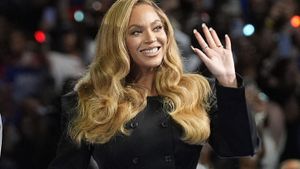Just days after being blindsided by the news of TikTok's shutdown, millions of Americans are grappling with the abrupt rollercoaster ride of emotions surrounding their favorite app's fate. On January 18, 2025, TikTok went dark for its nearly 170 million U.S. users as the Protecting Americans from Foreign Adversary Controlled Applications Act (PAFACA) took effect, following the Supreme Court's ruling upholding the law.
Passed with bipartisan support, the law mandates foreign-controlled apps to either divest their U.S. operations or face prohibition. UCF student Alex Khoriokav expressed his disappointment, stating, "Leading up to the anticipated TikTok ban, I felt more upset about losing all the saved videos and info than about my own account disappearing." Meanwhile, on January 19, TikTok made a surprise return after President Trump declared he would use executive powers to extend the company’s operations and broker deals to protect national security.
Haley Mcleer, another student, commented on the quick resolution, saying, "When it did get banned I did definitely expect it to last longer than a day, I was definitely not expecting it to come back so quick." This sentiment reflected the confusion and urgency felt among users who rely on TikTok not just for entertainment but for community and self-expression.
On social media, singer Kesha turned the ban’s drama on its head with humor. Posting on Instagram, she quipped, "TikTok may be temporary, but TiK ToK is forever," delighting fans and attracting commentary from fellow artists who rallied around TikTok's cultural significance. This reaction underscored the platform's deep roots within pop culture, igniting nostalgia and creativity among its users.
Yet the ban’s ripple effects were felt beyond the digital space. The Fond du Lac Police Department reported on arson related to TikTok’s temporary absence. A 19-year-old man admitted to setting fire to the district office of Congressman Glenn Grothman, who had voted for the bill imposing the ban. Grothman swiftly tweeted, "Thank you to the FDL firefighters and police officers for your swift response," relieving fears as no one was injured during the incident.
Grothman's office faced consequences stemming from national security measures, reflecting the length of the stakes involved. Fond du Lac Police Chief Aaron Goldstein stressed, "Acts of violence, in any form, are not tolerated," as discussions around TikTok intensified nation-wide.
Back on Capitol Hill, Trump asserted control over TikTok's fate, pledging to take action on the looming ban, Labor Secretary Mike Waltz describing the president-elect's commitment to preserving access to the app without compromising user data. The real decision now lies with the Trump administration, especially as it prepares for the monumental task of enforcing or potentially reversing the ban.
Nonetheless, the back-and-forth has left users and company executives feeling jittery. TikTok’s leadership, now racing against the clock under threat of permanent removal from the U.S. market, shared relief as operations resumed for users. CEO Shou Zi Chew declared their intent to fight for the app’s continued availability, stating, "We are grateful and pleased to have the support of a president who truly understands our platform."
The Supreme Court's decision remains pivotal, citing national security concerns and the need for more scrutiny over foreign data usage. Yet as the political tides shift, TikTok’s cultural relevance hangs on the balance of legal votes and governmental maneuvers. The saga underlines the magnitude of TikTok's impact and its contentious rowing between tech and governance.
With ByteDance's future uncertain and the rapidly changing political climate, only time will reveal whether TikTok remains embedded as part of American culture or fades as yet another casualty of geopolitical tensions.



